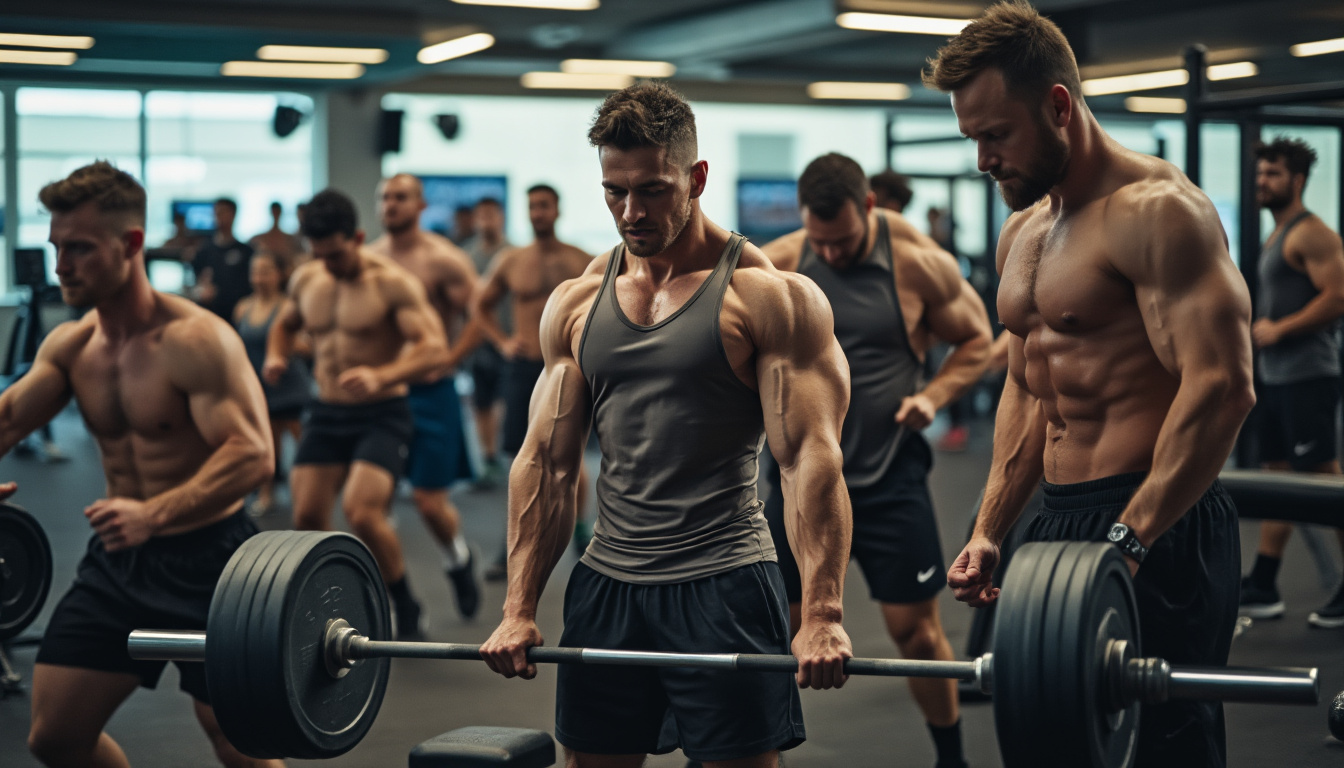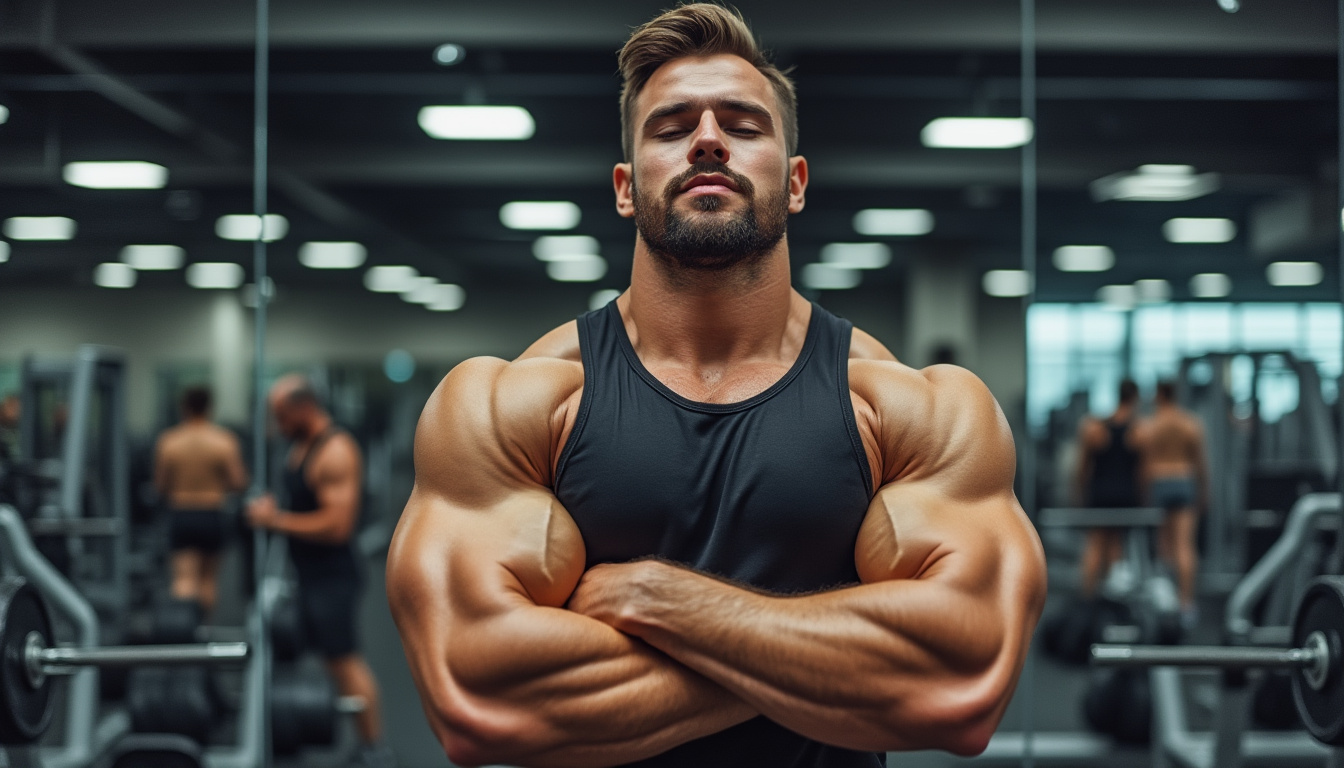Weightlifting has seen unprecedented growth since the pandemic, highlighting the importance and appeal of a muscular body in our modern society. Well-defined pecs, often associated with icons like Ryan Gosling, are becoming a true symbol of virility, inspiring desire and aspirations in many men. Today, we will explore this obsession that manifests through various fitness practices and a lifestyle oriented towards bodybuilding.
From gym chains to trends on social media, the enthusiasm for fitness inspires a great number of men to rethink their relationship with their bodies. This physical transformation is not just a simple aesthetic quest; it comes with palpable psychological and social changes. This article will delve into the universe where the obsession with pecs finds its roots and develops.
The Return to Weightlifting Post-Covid
The Covid-19 pandemic has profoundly changed our lifestyles, and sports practice has not escaped this. Successive lockdowns have led to a reevaluation of physical activity. Many individuals, often cooped up at home, have become aware of the importance of taking care of their bodies. This has led to a significant upswing in weightlifting and fitness. Attendance at gyms, once limited to an elite, has become widely democratized.

The Numbers Speak for Themselves
According to recent data, about 7 million French people belong to gyms, which represents nearly one in ten French individuals. This figure reflects a rising interest in sports across France. Fitness chains, such as BasicFit, attract more and more followers with modern facilities and varied equipment. These places are becoming not only training venues but also social spaces where men push each other to achieve spectacular results.
Men, who may have previously been hesitant to engage in weight training, are now discovering various techniques from kettlebells to dips and jump jacks. These new training modalities reinvigorate a traditional concept, and men seem more motivated than ever in their quest for performance. By comparing themselves to iconic figures like Ryan Gosling, many find inspiration in this culture of a muscular body.
Reevaluation of Masculine Image
This obsession with pecs and the gym often manifests as a reevaluation of masculine image in modern society. Social and cultural expectations surrounding virility are being redefined, placing musculature as a symbol of achievement. Being “muscular” has become synonymous with being “successful.” Men’s clothing brands increasingly emphasize the idea that fit and style should enhance this image of physical strength.
Social Media and Bodybuilding Culture
Social media have played a key role in the democratization and diffusion of this obsession with the muscular body. Platforms like Instagram, Facebook, or TikTok allow users to display their personal journey towards better physical condition. Fitness accounts, dotted with images of sculpted bodies, attract millions of followers seeking inspiration and wishing to imitate those who showcase impressive results.
Influence of Fitness Influencers
Countless fitness influencers share their own journeys, training techniques, and nutritional advice. Ryan Gosling himself, although not a fitness influencer per se, remains a reference in terms of masculine aesthetics and weightlifting. Men turn to these iconic figures seeking to understand how they can achieve similar goals.
Online content encourages men to adopt healthier lifestyles, but it also exerts enormous pressure on those who feel they are competing online. From weightlifting challenges to before-and-after transformations, men are battling against a tsunami of often unrealistic perfection. This can lead to unhealthy behaviors regarding self-esteem and body image.
Brands Committed to This Transformation
With this rise in masculine obsession, men’s clothing brands have emerged, focusing on fitness and the masculine lifestyle. These brands do not just sell clothing; they promote a lifestyle. People no longer just consume clothing; they buy an image. The connection between fitness, men’s fashion, and self-image is stronger than ever.
Men seek clothing that highlights their pecs and performance in the gym. They dream of wearing brands that symbolize this success, such as Nike, Adidas, or Under Armour, while hoping to be perceived as the new Ryan Gosling of their time.
The Psychology of Masculine Obsession with Pecs

Understanding the psychology behind this masculine obsession with pecs is essential to grasp the scope of the phenomenon. Often, this quest for muscles transforms into a means of compensating for deep insecurities. The societal pressure that values muscular bodies can provoke compensatory behaviors, where men rush to the gym to prove their worth.
The Construction of Self-Esteem
For many men, getting muscular becomes much more than a simple matter of aesthetics; it is a powerful driver of self-esteem. The image one has of oneself is often influenced by the social environment. Men are confronted with regularly updated beauty standards, and their need to conform can lead them to spend hours at the gym. This shapes a behavior that is often obsessive where success is synonymous with physical performance.
This quest for body construction can be a virtuous circle as well as a vicious circle. When a man sees progress in his pecs, it can reinforce his motivation and desire to continue. Paradoxically, it can also generate anxiety and dissatisfaction, especially in a culture where peer comparisons are omnipresent.
A Change in Perspective on Masculinity
Over time, this obsession with pecs also embodies a shift in perceptions of masculinity. The emphasis on physical strength is gradually complemented by other dimensions, such as mental health and emotional intelligence. Many men realize that it’s not just about lifting weights but also about creating harmony between body and mind.
Recent studies show that some men advocate for a more inclusive vision of masculinity, which encourages them to talk about their internal struggles and vulnerabilities, while still aspiring to this physical virility. This opens the door for a new generation that embraces both the idea of working on their muscles while caring for their emotional well-being.
Cultural Rise Around Pecs and Fitness
The rise of fitness as a lifestyle is accompanied by a broader cultural movement. Bodybuilding is no longer viewed as something inherent to a separate niche but as a component of popular culture. Movies, documentaries, and reality shows propagate a certain image of musculature, establishing norms that are often difficult to attain.
Film and Masculine Icons
Actors like Ryan Gosling often appear as examples of spectacular physical transformation. The roles they embody, often muscular and charismatic, contribute to an image of ideal men who are admired on the big screen. These representations influence behaviors, creating a clear gap between reality and individual expectations.
Many directors state that they choose muscular actors not only for their talent but also for their physical power. Stories of muscular heroes attract an audience, fueling a cycle where physical image prevails. In this way, popular culture becomes a powerful vector of inspiration but also of comparison.
Emerging Fitness Communities
Meanwhile, fitness communities are emerging around these norms, providing a framework of encouragement and motivation for men. Groups on social media, discussion forums, and sporting events reinforce this sense of belonging. Exchanges and sharing of experiences create connections but can also establish a dynamic of competition that can be pernicious.
| Transformation Criteria | Estimated Time | Training Frequency | Suitable Diet |
|---|---|---|---|
| Pecs Improvement | 3 months | 4-5 times/week | High in protein |
| Fat Loss | 2 months | 5-6 times/week | Balanced, low in fat |
| Muscle Gain | 6 months | 3-4 times/week | High in calories |
The challenge with these communities remains not to get caught up in sly comparisons and a morbid obsession with appearance, but rather to adopt a healthy and sustainable approach. Far from being solely a matter of appearance, fitness should be seen as a path toward kindness to oneself, both physically and psychologically.
My name is Lucas, and I am a fitness coach specializing in sports and well-being. Passionate about fitness and health, I am here to guide you on your journey toward better physical shape and a healthier life. Together, we will reach your goals and help you exceed your limits!


